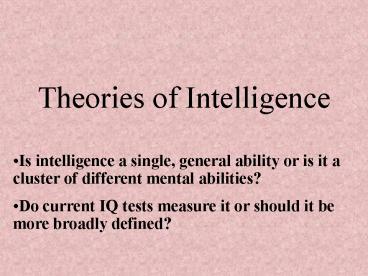Theories of Intelligence - PowerPoint PPT Presentation
1 / 27
Title:
Theories of Intelligence
Description:
Charles Spearman 'g' factor. Louis Thurstone intelligence as a person's ' ... John Audubon, naturalist. 8. Naturalist ('nature smart') Mahatma Gandhi, leader ... – PowerPoint PPT presentation
Number of Views:9920
Avg rating:5.0/5.0
Title: Theories of Intelligence
1
Theories of Intelligence
- Is intelligence a single, general ability or is
it a cluster of different mental abilities? - Do current IQ tests measure it or should it be
more broadly defined?
2
Theories of Intelligence
- Charles Spearmang factor
- Louis Thurstoneintelligence as a persons
pattern of mental abilities - Howard Gardnermultiple intelligences
- Sternbergtriarchic theory
- Emotional Intelligence - ability to perceive,
express, understand, and regulate emotions
3
Spearmans General Intelligence
4
Charles Spearman (1863-1945)
- Theorized that a general intelligence factor (g)
underlies other, more specific aspects of
intelligence - Based this on how he noticed people who did well
on one test tended to do similarly well on
others. - Agreed with Terman that a single overall IQ score
was best.
5
Louis L. Thurstone
- Intelligence is a cluster of abilities.
- Believed that there were 7 different primary
mental abilities each independent from the
other. - Examples Verbal Comprehension, numerical
ability, reasoning perceptual speed - The g factor was just an overall average score of
these independent abilities. - Looked for a pattern of mental abilities like
Wechsler.
6
Howard GardnersMultiple Intelligences
7
Howard Gardner (1943- )
- Author of a contemporary theory of multiple
intelligences consisting of eight separate kinds
of intelligence - Multiple Intelligences several independent
mental abilities that allow a person to solve
problems, create products that are valued within
ones culture. - Intelligence defined within the context of
culture
8
Gardners Types of Intelligence
9
Gardners Types of Intelligence
10
Gardners Types of Intelligence
11
Gardners Types of Intelligence
12
Gardners Types of Intelligence
13
Gardners Types of Intelligence
14
Gardners Types of Intelligence
15
Gardners Types of Intelligence
16
Howard Gardners Multiple Intelligences
17
Howard Gardners Eight Intelligences
18
Robert Sternbergs Triarchic Theory of
Intelligence
19
Robert Sternberg (1949- )
- Author of a Triarchic theory of multiple
intelligences consisting of 3 mental abilities - Stresses both the universal aspects of
intelligent behavior and the importance of
adapting to a certain social and cultural
climate. - Also called Successful Intelligence
20
Robert Sternberg
- Analytic intelligencemental processes used in
learning how to solve problems - Creative intelligenceability to deal with novel
situations by drawing on existing skills and
knowledge - Practical intelligenceability to adapt to the
environment (street smarts)
21
Sternbergs Types of Intelligence
22
Sternbergs Types of Intelligence
23
Sternbergs Types of Intelligence
24
Triarchic Examples in Literature
25
Emotional Intelligence
26
Emotional Intelligence
- The ability to perceive, express, understand, and
regulate emotions - People high in emotional intelligence are more in
touch with their feelings and the feelings of
others.
27
- IQ Tests do a good job measuring
- Abstract thinking
- Problem solving
- Capacity to acquire knowledge
- IQ Tests however do not measure
- Creativity
- Achievement motivation
- Goal-oriented behavior
- Ability to adapt to ones environment































